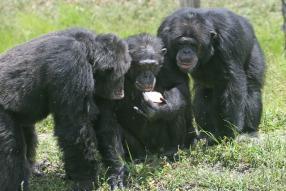Chimps are very, very clever. So clever, in fact, that they engage in politics; building alliances to take on other chimps and claw their way up the social ladder as they play their own version of the game of thrones. Their political machinations have resulted in the development of some very impressive intellectual abilities; including being able to figure out who is related to whom. Show a chimp a picture of a parent and a bunch of kids and they can figure out who belongs to the parent1; from which they could figure out who likes whom and how this will influence their plans for the banana throne (fun fact, many species of primate prefer grapes to bannanas).
But can they figure out who is related to them? It seems like a fairly obvious extension of their ability to spot relatives, but it isn’t as easy as it might first seem. After all, when looking at parents and children you already have a “template” (the parent) against which you can compare the offspring. What template are you going to use for your relatives? Your own? The jungle isn’t exactly known for being full of mirrors and, to make matters worse, I bet The Lineages and Histories of the Great Houses of the Seven Kingdoms would contain no useful information on the great chimp houses.

Reading opportunities in general are rare in the jungle.
Nevertheless, new research in macaques has revealed for the first time that primates are able to recognize their own relatives. The researchers opted for macaques rather than chimps for their study as the former lives in larger groups with more relatives; allowing them to pick distantly related monkeys who haven’t met, they could rule out “familiarity” as a way for figuring out who is related. Macaques are also a lot less evil than chimps, so I can’t blame the researchers for wanting to use them instead. The scientists also used half-siblings in the experiment (adult macaques are all about the scandal), further reducing how much they could rely on resemblance to other relatives2.
Yet despite stacking the deck against them so much, the macaques were still able to identify their relatives (which I just said in the previous paragraph, I hope you were paying attention). The researchers had no clue as to how they were able to do this. Perhaps they did make a “template” based on relatives they were familiar with, or maybe they had figured out what they looked like somehow, so could use that to figure out who were their relatives2.
Regardless, this is an ability that would have great evolutionary benefits; so likely is the product of evolution. Figuring out who you’re related to means you can aid them, increasing the overall success of your genes (since you share some with them).
It also stops you mating with close relatives which, as you probably know, can have some nasty consequences.

I propose all future research on the negative effects of inbreeding cites George R. R. Martin
References
- Parr, L. A., Heintz, M., Lonsdorf, E., & Wroblewski, E. (2010). Visual kin recognition in nonhuman primates:(Pan troglodytes and Macaca mulatta): Inbreeding avoidance or male distinctiveness?. Journal of Comparative Psychology, 124(4), 343.
- Pfefferle, D., Kazem, A. J., Brockhausen, R. R., Ruiz-Lambides, A. V., & Widdig, A. (2014). Monkeys Spontaneously Discriminate Their Unfamiliar Paternal Kin under Natural Conditions Using Facial Cues. Current Biology.

